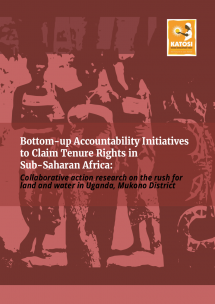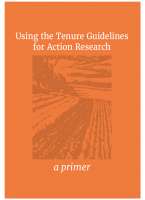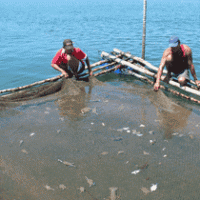Country Report on Uganda Bottom-up Accountability Initiatives to Claim Tenure Rights in Sub-Saharan Africa
Topics
Regions
Findings reveal that lawlessness (in some cases), ignorance of the law, evictions and unlawful relocations, increasing pressure and conflicts emerging in fishing communities, as well as neighbouring farming communities are all leading to communities losing access to the land and fishing grounds on which they have survived for many years, leading to unemployment and loss of livelihoods among the fisher folks.

Download PDF
Summary of the report
This action research project is being implemented by KWDT with support from TNI and FIAN. The action research project aims to answer the following questions and achieve the objectives therein: understanding the local commu nities’ knowledge, visions and practices regarding natural resource governance and development, strengthening the research capacity of small scale food producers’ organisations, identifying the main gaps in and obstacles to applying international human rights law to land, and strengthening the advocacy capacity of small scale food producers, and identifying strategies to overcome the above-mentioned gaps.
Participatory research methods have been used to ensure active participation of the people being affected. These include focus group discussions, key informant interviews, community dialogues, household in-depth interviews, and a review of literature, as well as informal discussions with community members and leaders. The current phase of the project, however, (year 3 of the project), is action oriented, engaging the affected communities in analysing, under standing, and taking active steps towards solving the problems of land grabbing in their communities. Findings reveal that lawlessness (in some cases), ignorance of the law, evictions and unlawful relocations, increasing pressure and conflicts emerging in fishing communities, as well as neighbouring farming communities are all leading to communities losing access to the land and fishing grounds on which they have survived for many years, leading to unemployment and loss of livelihoods among the fisher folks. Other issues revealed by the project include: increased hostility aggravating existing tribal differences among the people, obstruction of much needed local investments as well as increased vulnerability of women.
The project has empowered local community members not only to better understand the dynamics surrounding large scale land acquisition in their area, but also to address these challenges and increase their resistance to land grab- bing.
This report gives the background and context of the research, clarifies the legal and policy framework governing the use of land in Uganda, provides background on the Mukono district, and lays out the research problem, the method- ology, findings and emerging issues of the study, as well as providing recommendations and ideas for further action.

